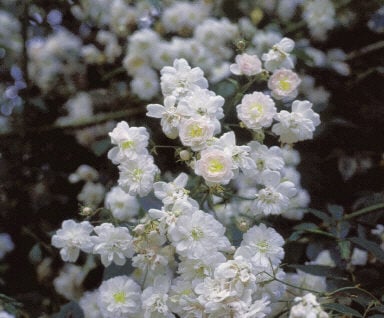Rosa 'Paul's Himalayan Musk' (Ra)
rose 'Paul's Himalayan Musk'
Rampantly vigorous, large climber about 6m tall, with long, trailing, pliable stems bearing broad, hooked thorns and drooping dark green leaves, copper tinted when young. Very free-flowering, slightly scented, small, blush-pink, double blooms in large drooping clusters, once-flowering in midsummer; W. Paul
Size
Ultimate height
8–12 metresTime to ultimate height
5–10 yearsUltimate spread
4–8 metresGrowing conditions
Moisture
Moist but well–drained, Well–drainedpH
Acid, Alkaline, NeutralColour & scent
| Stem | Flower | Foliage | Fruit | |
| Spring | Bronze Green | |||
|---|---|---|---|---|
| Summer | Pink | Green | ||
| Autumn | Green | |||
| Winter |
Position
- Full sun
- Partial shade
Aspect
South–facing or West–facing or East–facing
Exposure
Sheltered Hardiness
H6Botanical details
- Family
- Rosaceae
- Native to GB / Ireland
- No
- Foliage
- Deciduous
- Habit
- Climbing
- Potentially harmful
- Fruit are ornamental - not to be eaten. Wear gloves and other protective equipment when handling. Pets: Fruit are ornamental - not to be eaten - see the HTA guide to potentially harmful plants for further information and useful contact numbers
- Genus
Rosa can be deciduous or semi-evergreen shrubs or scrambling climbers, with usually thorny stems bearing compound pinnate leaves and solitary or clustered flowers. Flowers may be followed by showy red or purple fruits in some varieties.
- Name status
Accepted
- Horticultural Group
- Rambler roses are vigorous shrubs with long, arching, thorny or smooth stems carrying glossy foliage and large sprays of small, single or double, often fragrant flowers in early summer
How to grow
Cultivation
A rose for a large space that grows best in full sun with fertile, humus-rich, moist but well-drained soil. For best flowering apply a balanced fertiliser and mulch in late winter or early spring - see rose cultivation. Tolerant of poor soil and shade, and ideal for climbing into a tree
Propagation
Propagate by hardwood cuttings in autumn or by chip budding in summer
Suggested planting locations and garden types
- Cottage and informal garden
- Wall side borders
Pruning
Pruning group 18 (rambling roses) - see our video How to prune rambling roses
Pests
May be susceptible to aphids, rose leafhopper, glasshouse red spider mite, scale insects, caterpillars, large rose sawfly and rose leaf-rolling sawfly. Rabbits and deer can cause damage
Diseases
May be susceptible to rose black spot, rose rust, replant disease, rose dieback, and rose powdery mildew and sometimes honey fungus. May also be susceptible to disorders rose blindness and flower balling
Get involved
The RHS is the UK’s gardening charity, helping people and plants to grow - nurturing a healthier, happier world, one person and one plant at a time.
